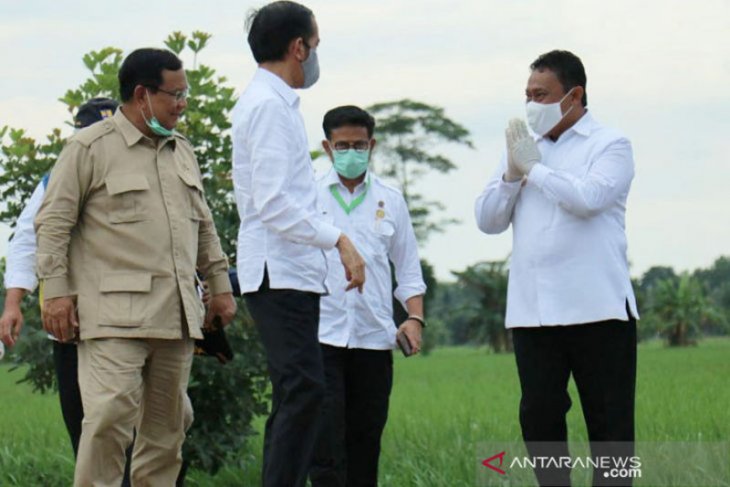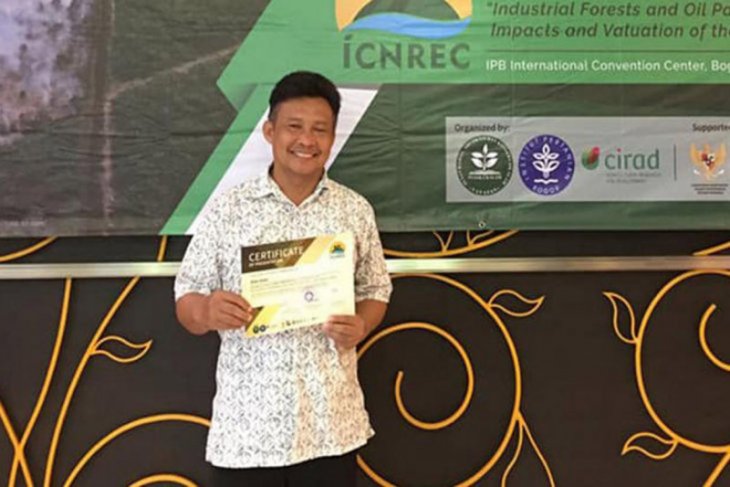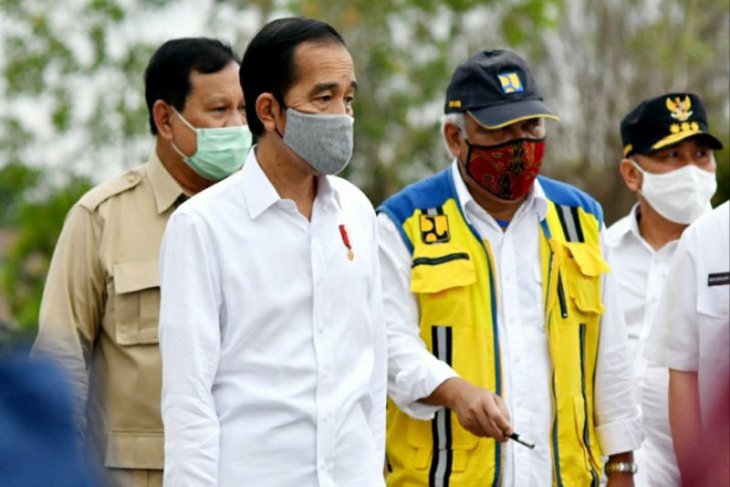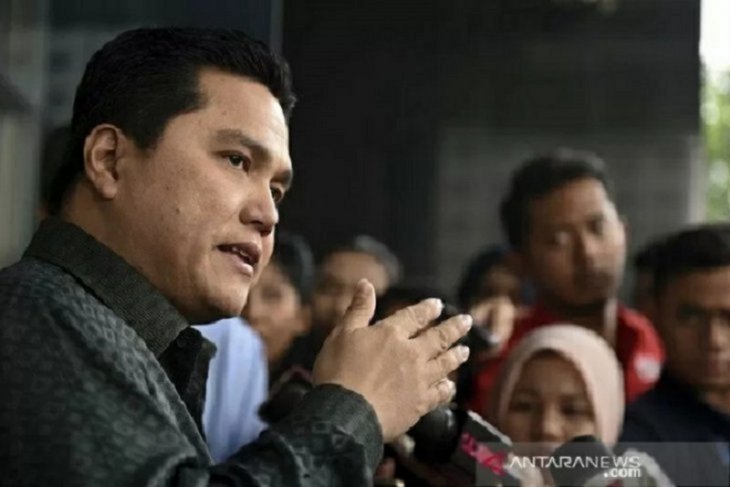Live Streaming
Program Highlight
Company Profile

Ani Hasanah
July

President Joko Widodo (third right). ANTARA/HO-Pulang Pisau District Administration
Farmers from Pulang Pisau District in Central Kalimantan Province would be able to capitalize on the Indonesian Government's food-estate program, as it would help boost their incomes, the district's head, Edy Pratowo, stated.
In conversation with local journalists after joining President Joko Widodo's entourage during his official visit to Blanti Siam Village in Pulang Pisau District on Thursday, Pratowo spoke of the government developing its food-estate program in the district's area.
This food-estate program was not solely targeting to preserve Indonesia's food stockpiles but also focused at boosting the country's agricultural production, Pratowo explained.
"The Food and Agriculture Organization (FAO) of the United Nations has warned that the ongoing COVID-19 pandemic may trigger a shortage of food stockpiles," he pointed out.
With food security being the top priority, the government has been working on its food estate program by developing 165 thousand hectares of land into farmland in Pulang Pisau District, Central Kalimantan Province.
The central government is sentient of the importance of boosting the nation's food security amid this ongoing global COVID-19 pandemic and beyond.
During his visit to the village whose area is used for developing new farmland for the food-estate program, President Widodo was accompanied by several cabinet members and top officials, including Defense Minister Prabowo Subianto.
Apart from Subianto, the president's entourage also comprised Minister of Agriculture Syahrul Yasin Limpo, Public Works and Housing Minister Mochamad Basoeki Hadimoeljono, and Presidential Chief of Staff Moeldoko.
According to ANTARA’s observation, despite a steady rise in Indonesia's population, the country had yet to achieve food security, which by definition is related to "food availability, food access, and food utilization" (USAID 1995 in FAO).
Rather than feed its people the rice produced by its own farmers, the central government has frequently imported rice over the past years to meet the public’s requirements.
This condition has, indeed, posed a grave challenge and does not bode well with Indonesia's status as one of the world's top agricultural countries.
Indonesia should not make it a permanent practice to import rice from countries, including Thailand and Vietnam, since it will potentially disadvantage local farmers and threaten its national security in the long term.
On April 21, 2020, President Widodo had called on officials to make a precise assessment of Indonesia's rice stocks.
The president's directive came on the back of the FAO of the United Nations' warning of the COVID-19 pandemic triggering a global food crisis. (ANTARA)
July

Kitso, a senior researcher of the Palangka Raya University's Natural Laboratory of Peat Swamp Forest (NLPSF). ANTARA/HO-Dokumentasi pribadi
A senior researcher of the Palangka Raya University's Natural Laboratory of Peat Swamp Forest (NLPSF) suggested that a peatland area of depth below 50 centimeters could serve to support Indonesia's food-estate program.
"I disagree with the use of a peatland area of depth of more than 50 centimeters," Kitso, a researcher of the university's NLPSF, stated in connection with the government's plan to create new rice fields in Kalimantan to boost the country's food security.
In conversation with ANTARA news agency in Jakarta on Thursday, Kitso remarked that not all peatland areas can be used for rice farming, though the location of the government's food-estate program was in the former areas of one million hectares of a peatland project.
Kitso cautioned that if new rice fields for the government's food-estate project were opened in peatland areas of depth over 50 centimeters, it would be detrimental to the environment.
The cultivation of peatland areas, with depth of more than 50 centimeters, could also trigger the recurrence of huge land and forest fires akin to that in 1996 and 1997, he pointed out.
The central government had recently revealed its plan to expand its food-estate program by developing 165 thousand hectares of land into farmland in Pulang Pisau District, Central Kalimantan Province.
The government is sentient of the importance of boosting the nation's food security amid this ongoing global COVID-19 pandemic and beyond.
On April 21, 2020, President Joko Widodo (Jokowi) had urged officials to make an accurate assessment of Indonesia's rice stocks.
The president's directive came on the back of the Food and Agriculture Organization (FAO) of the United Nations’ warning of the COVID-19 pandemic triggering a global food crisis.
Speaking in connection with Indonesia's rice stocks, Coordinating Minister for Economic Affairs Airlangga Hartarto had earlier revealed that the country's rice stocks were estimated to reach 4.7 million tons until the end of 2020.
Hartarto informed the press following a virtual limited cabinet meeting chaired by President Joko Widodo (Jokowi) in Jakarta last May that the National Logistics Agency (Bulog) was tasked with maintaining rice stocks of over one million tons.
Hartarto noted that Bulog will absorb 900 thousand to 1.4 million tons of grains of the farmers.
Meanwhile, Agriculture Minister Syahrul Yasin Limpo noted that the national stocks of 11 commodities were forecast to remain safe until June.
The commodities comprise rice, corn, shallots, garlic, large chili, cayenne pepper, beef, buffalo meat, chicken eggs, cooking oil, and granulated sugar. (ANTARA)
July

President Joko Widodo. ANTARA/HO-Central Kalimantan Provincial Government
President Joko Widodo (Jokowi) arrived at the Tjilik Riwut Airport in Palangka Raya, Central Kalimantan, and later headed to Kapuas District on Thursday.
The head of state visited Bentuk Jaya Village, Dadahup Sub-district, to observe the location of the food estate program that is projected to boost the country's food resilience.
During the working visit, Jokowi was accompanied by Defense Minister Prabowo Subianto, Agriculture Minister Syahrul Yasin Limpo, and Public Works and Public Housing (PUPR) Minister Basoeki Hadimoeljono.
Chief of the Presidential Staff Moeldoko, Central Kalimantan Governor Sugianto Sabran, and Kapuas District Head Ben Brahim S. Bahat were also present along with the head of state during the visit.
Moreover, Jokowi and his entourage were scheduled to visit Gadabung Village in Pandih Batu Sub-district and Pulang Pisau before returning to Palangka Raya.
In the meantime, the government has planned to establish a new food estate in the country to ascertain adequate food supplies for the public under the implementation of the National Strategic Program (PSN).
Coordinating Minister for Economic Affairs Airlangga Hartarto remarked in a statement recently that the new food estate will be located in Pulang Pisau District in Central Kalimantan.
"All parties will be involved in the program. This will be a sustainable program that will benefit the nation," Hartarto affirmed.
Development of the food estate has become part of the government's National Strategic Program to be implemented within the next three years. The PUPR Ministry had earlier targeted to revive 165 thousand hectares of land as a food estate in Central Kalimantan during the 2020-2022 period to realize national food resilience.
President Joko Widodo has tasked the ministry with developing the food estate that is projected to become a new food barn outside Java Island.
The PUPR ministry’s 2020-2021 priority program aims at structuring strategic tourism areas, expediting toll road construction, boosting cash-intensive labor, and developing food estate areas and human resources.
The Ministry of Villages, Development of Disadvantage Regions and Transmigration stated that the agriculture intensification program will cover 10,594 hectares of transmigration area in 55 villages. (ANTARA)
July

Minister of State-Owned Enterprises (SOEs) Erick Thohir. (ANTARA)
State-Owned Enterprises (SOEs) Minister Erick Thohir has forecast Indonesia’s economy to fully recover in the first quarter of 2022 akin to what it was before the COVID-19 pandemic struck.
"We could probably witness a full economic recovery by the first quarter of 2022 similar to that in 2019," Thohir stated in Jakarta on Thursday while adding that the figure could only reach 40-60 percent by the end of this year, while in 2021, it might grow to above 75 percent.
"One aspect that we should all agree upon is that COVID-19 has affected the health and economic sectors, thereby necessitating the handling of both in parallel," he emphasized.
The Ministry of SOEs will coordinate with the Ministry of Health as well as other ministries and governmental institutions, including the local and regional governments, to support economic revival and boost the performance of SOEs’ businesses, in particular.
The performance of SOEs’ businesses depends on the type of business since several enterprises have shifted their business patterns to adapt to the new normal scenario.
"I am highly optimistic of the performance of SOEs always being maintained, particularly in facing this COVID-19 pandemic. Furthermore, they could achieve some breakthroughs to ease the burden on our people and the government," Thohir stated. (ANTARA)

